浙江省宁波市江南中学2013届中考英语模拟5月试题(一) 人教新目标版
- 格式:doc
- 大小:394.50 KB
- 文档页数:10
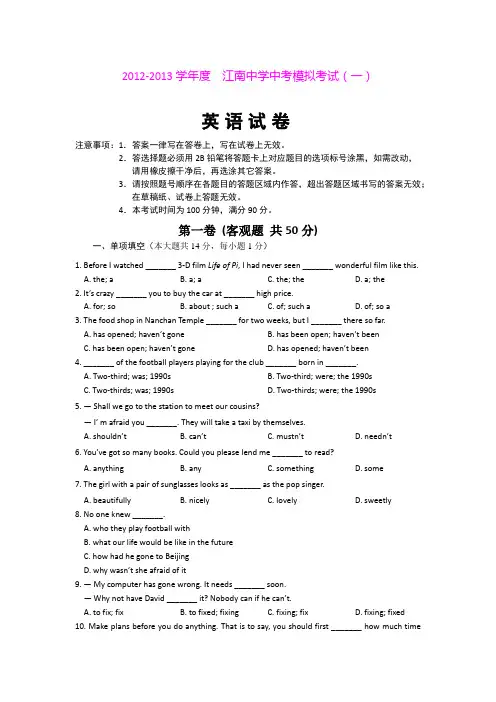
2012-2013学年度江南中学中考模拟考试(一)英语试卷注意事项:1.答案一律写在答卷上,写在试卷上无效。
2.答选择题必须用2B铅笔将答题卡上对应题目的选项标号涂黑,如需改动,请用橡皮擦干净后,再选涂其它答案。
3.请按照题号顺序在各题目的答题区域内作答,超出答题区域书写的答案无效;在草稿纸、试卷上答题无效。
4.本考试时间为100分钟,满分90分。
第一卷(客观题共50分)一、单项填空(本大题共14分,每小题1分)1. Before I watched _______ 3-D film Life of Pi, I had never seen _______ wonderful film like this.A. the; aB. a; aC. the; theD. a; the2. It’s crazy _______ you to buy the car at _______ high price.A. for; soB. about ; such aC. of; such aD. of; so a3. The food shop in Nanchan Temple _______ for two weeks, but I _______ there so far.A. has opened; haven’t goneB. has been open; haven’t beenC. has been open; haven’t goneD. has opened; haven’t been4. _______ of the football players playing for the club _______ born in _______.A. Two-third; was; 1990sB. Two-third; were; the 1990sC. Two-thirds; was; 1990sD. Two-thirds; were; the 1990s5. — Shall we go to the station to meet our cousins?—I’ m afraid you _______. They will take a taxi by themselves.A. should n’tB. can’tC. mustn’tD. needn’t6. You’ve got so many books. Could you please lend me _______ to read?A. anythingB. anyC. somethingD. some7. The girl with a pair of sunglasses looks as _______ as the pop singer.A. beautifullyB. nicelyC. lovelyD. sweetly8. No one knew _______.A. who they play football withB. what our life would be like in the futureC. how had he gone to BeijingD. why wasn’t she afraid of it9. — My computer has gone wrong. It needs _______ soon.—Why not have David _______ it? Nobody can if he can’t.A. to fix; fixB. to fixed; fixingC. fixing; fixD. fixing; fixed10. Make plans before you do anything. That is to say, you should first _______ how much timeyou need to finish it.A. work outB. work onC. take outD. come out11. _______ twins from all over the world take part in the Twins Days Festival on August 5 in thecity of Twinsburg, Ohio every year.A. Thousand ofB. Three thousand ofC. Thousands ofD. Three thousands of12. The young lady prefers _______ to _______ when she feels stressed.A. going shopping; calming downB. to go shopping; calm downC. going shopping; calm downD. to go shopping; calming down13. — Your picture is wonderful!— I worked for 8 hours _______ I finished it.A. beforeB. whenC. whileD. after14. — If you are in trouble, make sure to call the police.— _______A. I’m happy to hear that.B. I don’t know.C. I will. Thanks a lot.D. I have to think about it.二、完形填空(本大题共10分,每小题1分)One day, a teacher was giving a speech to his students. He held up a glass of water and asked the class, “How 15 do you think this glass of water is?”The students’ answers were quite 16 ─from 20g to 500g. “It doesn’t matter on the weight itself. It is decided by how long you 17 it. If I hold it for a minute, it is 18 . If I hold it for an hour, you will 19 to call an ambulance (救护车). It is exactly the same weight, but the longer I hold it, the heavier it b ecomes.”“If we carry our burdens (负担) all the time, sooner or later, we will not be able to carry on 20 the burden is becoming much heavier.”“What you have to do is to put the glass 21 , rest for a while before holding it up again.”We have to put down the burden sometimes so that we can 22 and are able to carry on. So after you return from 23 tonight, put the burden of the work down. Don’t carry it back home. You can 24 it up tomorrow.Whatever burden you are having now on your shoulders, let it down for a moment if you can.15. A. hot B. cold C. heavy D. light16. A. different B. same C. good D. bad17. A. drink B. hold C. throw D. take18. A. terrible B. heavy C. interesting D. light19. A. plan B. forget C. have D. remember20. A. because B. but C. though D. so21. A. up B. down C. off D. out22. A. relax B. sleep C. think D. wait23. A. home B. holiday C. rest D. work24. A. give B. clean C. pick D. turn三、阅读理解(本大题共26分,每小题2分)ATo us it seems so natural to put up an umbrella to keep the water off when it rains. But actually the umbrella was not invented as protection against rain. Its first use was as a shade (遮蔽) against the sun.Nobody knows who first invented it, but the umbrella was used in very ancient (古老的) times. Probably the first to use it were the Chinese, back in the eleventh century B.C.We know that the umbrella was used in ancient Egypt and Babylon as a sunshade. And there was a strange thing connected with its use: it became a symbol of honour and power. In the Far East in ancient times, the umbrella was allowed to be used only by royal (皇室的) people or by those in high office.In Europe, The Greeks were the first to use the umbrella as a sunshade. The umbrella was in common use in ancient Greece, but it is believed that the first people in Europe to use the umbrella as protection against the rain were the ancient Romans.During the middle ages, the use of the umbrella practically disappeared. Then it appeared again in Italy in the late sixteenth century. And again it became a symbol of power.Umbrellas have not changed much in style during all this time, though they have become much lighter in weight. It wasn’t until the twentieth century that women’s umbrellas began to be made in all kinds of colours.25. The first use of umbrellas was as __________.A. protection against rainB. protection against the sunC. a symbol of powerD. a symbol of honour26. According to the passage, the umbrella was probably first invented __________.A. in ancient ChinaB. in ancient EgyptC. in ancient GreeceD. in ancient Rome27. According to the passage, which of the following is NOT true?A. The umbrella didn’t change much in style in the 18th century.B. No one really knows who was the inventor of the umbrella.C. Once not everyone was allowed to use umbrellas.D. women’s umbrellas were ma de in all kinds of colours in the beginning.BIn Britain you may often hear “Drop in any time” or “Come to see me soon”, but you can’t really do that. People just say those things to make you feel welcome. It is better to telephone before visiting som eone at home. If you receive a written invitation to an event that says “RSVP”, you should reply to let the person who sent the invitation know whether or not you plan to go.You should never accept an invitation unless you really plan to go. You may refuse by saying, “Thank you for inviting me, but I will not be able to come.” If, after accepting, you are unable to go, be sure to tell those who are expecting you as soon as possible that you will not be there. Although it isnot necessarily expected that you give a gift to your host, it is considered polite to do so, especially if you have been invited for a meal. Flowers, chocolate, or a small gift are all appropriate (合适的). A thank-you note or telephone call after the visit is also considered polite and is an appropriate way to express your thanks for the invitation.28. What does the underlined word “RSVP” probably mean in Chinese?A. 请自便B. 请回复C. 请审阅D. 请来访29. What should you do if your British friend sends you an invitation but you do not want to go?A. Do not give him or her an answer.B. Tell another friend to go instead of you.C. Tell him or her that you can’t be there for some reason.D. Tell him or her that you don’t want to go there.30. Which of the following is considered impolite in Britain?A. Buy small presents when invited.B. Refuse the invitation without telling anyone.C. Write a thank-you note after a visit.D. Give a telephone call after a visit.COnce I thought love meant flowers, gifts and sweet kisses. So, I really doubted whether there was any love between my parents. Every day they were working hard to pay for my high school. They didn’t act in the romantic ways that I read in books and saw on TV, and they certainly didn’t send flowers to each other on Valentine’s Day (情人节).One day, my mother was sewing a quilt (被子). I asked her if there was any love between her and my dad. She stopped and raised her head in surprise. Then she went on with her work without saying anything. I was very worried because I thought I had hurt her feelings. But after a few minutes she said, “Look at this thread (线). Sometimes it appears, but most of the time it disappears in the quilt. If life is a quilt, then love is the thread. It can hardly be seen anywhere or at any time, but it’s really there, and makes the quilt long-lasting.” I listened carefully but I didn’t understand her until the next spring.My mother suddenly got seriously ill and had to stay in hospital for about a month. Every morning and evening after she returned from the hospital, my father helped her walk slowly along our country road. There were many beautiful flowers, green grass and trees, and the sun gently shone through the leaves. All of this made the most beautiful picture in the world. Reading their eyes, I knew they love each other deeply. From this experience, I realized that love is just a thread in the quilt of our lives. Love is inside, making life strong and warm.31. What does the underlined sentence in the third paragraph suggest?A. There is beautiful scenery where the writer lived.B. There is true love anywhere in the world.C. There is no love without beautiful flowers.D. There is true love between the writer’s parents.32. Why didn’t the writer’s mother a nswer his question immediately?A. Because her husband didn’t love her.B. Because she was thinking of a better answer.C. Because she didn’t love her husband.D. Because the writer had hurt her feelings.33. What is the best title of this passage?A. Love Is EverywhereB. Love Is Always RomanticC. Love: Thread in QuiltD. Love Can Last ForeverDThis year some twenty-three hundred teenagers (young people aged from 13 to 19) from all over the world will spend about ten months in US homes. They will attend US schools, meet US teenagers, and form impressions (印象) of the real America. At the same time, about thirteen hundred American teenagers will go to other countries to learn new languages and get a new understanding of the rest of the world.Here is a two-way student exchange in action. Fred, nineteen, spent last year in Germany with George’s family. In turn, George’s son Mike spent a year in Fred’s home in America.Fred, an active young man, knew l ittle German when he arrived, but after two months’ study, the language began to come to him. Schools were completely different from what he had expected ─ much harder. Students rose politely when the teacher entered the room. They took fourteen subjects instead of the six that are usual in the United States. There were almost no outside activities.Family life, too, was different. The father’s word was law, and all activities were around the family. Fred found the food too simple at first. Also, he missed having a car.“Back home, you pick up some friends in a car and go out and have a good time. In Germany, you walk, but you soon learn to like it.”At the same time, In America, Mike, a friendly German boy, was also forming his idea. “I suppose I should criticize (批评) American schools,” he says. “It is far too easy by our level. But I have to say that I like it very much. In Germany we do nothing but study. Here we take part in many outside activities. I think that maybe your schools are better in training for citizens (公民). There ought to be some middle ground between the two.34. The world exchange programme is mainly to __________.A. help teenagers in other countries know the real AmericaB. send students in America to travel in GermanyC. let students learn something about other countriesD. have teenagers learn new languages35. Fred and Mike agreed that __________.A. American food tastes better than German foodB. German schools were harder than American schoolsC. Americans and Germans were both friendlyD. There were more cars on the streets in America36. In American schools __________.A. there is some middle ground between the two teaching buildingsB. there are a lot of after-school activitiesC. students usually take fourteen subjects in allD. students spend long hours studying37. After experiencing the American school life, Mike thought __________.A. a better education should include something good from both America and GermanyB. German schools trained students to be better citizensC. American schools were not as good as German schoolsD. the easy life in the American schools was more helpful to students第二卷(主观题共40分)四、词汇运用(本大题共8分,每小题1分)(A) 根据句意,写出括号内所给单词的适当形式。
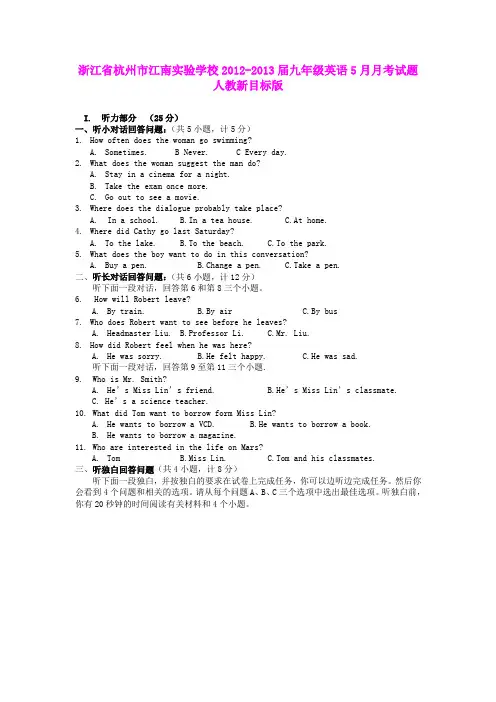
浙江省杭州市江南实验学校2012-2013届九年级英语5月月考试题人教新目标版I. 听力部分(25分)一、听小对话回答问题:(共5小题,计5分)1.How often does the woman go swimming?A.Sometimes. B Never. C Every day.2.What does the woman suggest the man do?A.Stay in a cinema for a night.B.Take the exam once more.C.Go out to see a movie.3.Where does the dialogue probably take place?A. In a school.B.In a tea house.C.At home.4.Where did Cathy go last Saturday?A.To the lake.B.To the beach.C.To the park.5.What does the boy want to do in this conversation?A.Buy a pen.B.Change a pen.C.Take a pen.二、听长对话回答问题:(共6小题,计12分)听下面一段对话,回答第6和第8三个小题。
6. How will Robert leave?A.By train.B.By airC.By bus7.Who does Robert want to see before he leaves?A.Headmaster Liu.B.Professor Li.C.Mr. Liu.8.How did Robert feel when he was here?A.He was sorry.B.He felt happy.C.He was sad.听下面一段对话,回答第9至第11三个小题.9. Who is Mr. Smith?A.He’s Miss Lin’s friend.B.He’s Miss Lin’s classmate.C. He’s a science teacher.10. What did Tom want to borrow form Miss Lin?A.He wants to borrow a VCD.B.He wants to borrow a book.B.He wants to borrow a magazine.11. Who are interested in the life on Mars?A.TomB.Miss Lin.C.Tom and his classmates.三、听独白回答问题(共4小题,计8分)听下面一段独白,并按独白的要求在试卷上完成任务,你可以边听边完成任务。
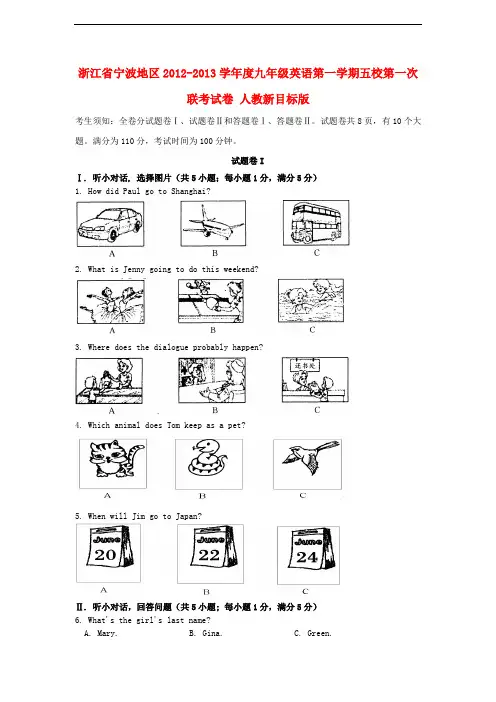
浙江省宁波地区2012-2013学年度九年级英语第一学期五校第一次联考试卷人教新目标版考生须知:全卷分试题卷Ⅰ、试题卷Ⅱ和答题卷Ⅰ、答题卷Ⅱ。
试题卷共8页,有10个大题。
满分为110分,考试时间为100分钟。
试题卷IⅠ. 听小对话, 选择图片(共5小题;每小题1分,满分5分)1. How did Paul go to Shanghai?2. What is Jenny going to do this weekend?3. Where does the dialogue probably happen?4. Which animal does Tom keep as a pet?5. When will Jim go to Japan?Ⅱ. 听小对话,回答问题(共5小题; 每小题1分,满分5分)6. What's the girl's last name?A. Mary.B. Gina.C. Green.7. How was Peter's school trip?A. It was boring.B. It was fun.C. It was bad.8. Do they think there will be robots in people's homes?A. No, there won't.B. Yes, there will.C. We don't know.9. Whose dictionary is it?A. Jim's.B. Mike's.C. Lucy's.10. What's the relationship between the two speakers?A. Husband and wife.B. Teacher and student.C. Doctor and patient.Ⅲ. 听长对话,回答问题(共5小题; 每小题1分,满分5分)听下面一段较长的对话,回答第11至12两小题。
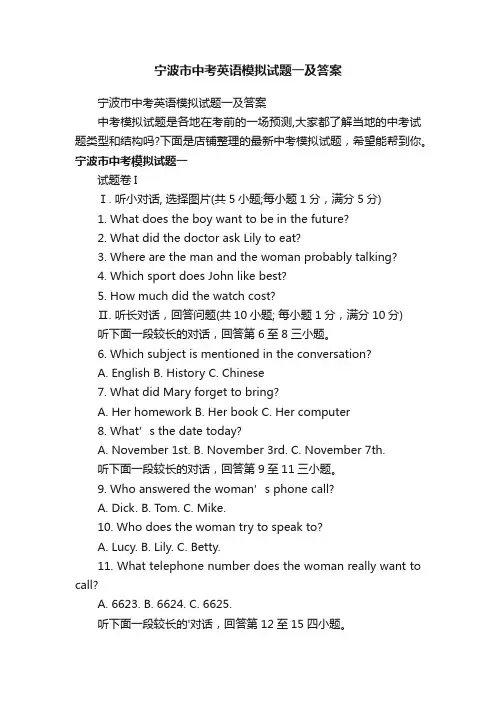
宁波市中考英语模拟试题一及答案宁波市中考英语模拟试题一及答案中考模拟试题是各地在考前的一场预测,大家都了解当地的中考试题类型和结构吗?下面是店铺整理的最新中考模拟试题,希望能帮到你。
宁波市中考模拟试题一试题卷IⅠ. 听小对话, 选择图片(共5小题;每小题1分,满分5分)1. What does the boy want to be in the future?2. What did the doctor ask Lily to eat?3. Where are the man and the woman probably talking?4. Which sport does John like best?5. How much did the watch cost?Ⅱ. 听长对话,回答问题(共10小题; 每小题1分,满分10分)听下面一段较长的对话,回答第6至8三小题。
6. Which subject is mentioned in the conversation?A. EnglishB. HistoryC. Chinese7. What did Mary forget to bring?A. Her homeworkB. Her bookC. Her computer8. What’s the date today?A. November 1st.B. November 3rd.C. November 7th.听下面一段较长的对话,回答第9至11三小题。
9. Who answered the woman’s phone call?A. Dick.B. Tom.C. Mike.10. Who does the woman try to speak to?A. Lucy.B. Lily.C. Betty.11. What telephone number does the woman really want to call?A. 6623.B. 6624.C. 6625.听下面一段较长的'对话,回答第12至15四小题。

中考模拟考试英语试卷英语(二)注意:(考试时间:120 分钟 满分:150 分)请把所有答案填涂或书写到答题卡上!请不要错位、越界答题! 在本试题上答题无效。
I .听力(共三节,20 小题,每小题 1.5 分,满分 30 分) 第一节听句子。
听下面五个(. C 12.CC 3.C4.5. A B C第二节听对话。
听下面七段对话,从每小题所给的A、B、C 三个选项中选出正确答案。
(每段对话读两遍)听第一段对话,完成第6小题。
6. Where are they now?A. At school.B. At home.C. At a shop.听第二段对话,完成第7小题。
7. How does the woman like the play?A. It is boring.B. It is interesting.C. It’s just so-so.听第三段对话,完成第8小题。
8. When will Mr. Green come back?A. At 7:15.B. At 7:30.C. At 7:45.听第四段对话,完成第9小题。
9. How much will the woman pay?A. 6 yuan.B. 9 yuan.C. 12 yuan.听第五段对话,完成第10、11小题。
10. What kind of rooms does the woman book?A. A single room and a double room.B. A single room and two double rooms.C. T wo single rooms and a double room.11. How long will the woman keep the rooms?A. Two hours.B. Two nights.C. Two weeks.听第六段对话,完成第12、13小题。
12. What is the man doing on the Internet?A. Buying a cap.B. Playing games.C. W atching a movie.13. What will the woman do next?A. Buy shoes on the Internet.B. Go shopping with the man.C. Learn how to shop on line.听第七段对话,完成第14、15小题。
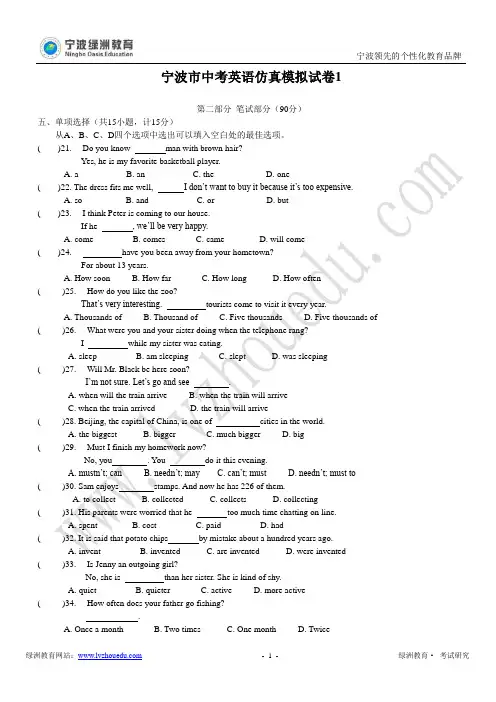
宁波市中考英语仿真模拟试卷1第二部分笔试部分(90分)五、单项选择(共15小题,计15分)从A、B、C、D四个选项中选出可以填入空白处的最佳选项。
( )21. ---Do you know man with brown hair?---Yes, he is my favorite basketball player.A. aB. anC. theD. one( )22. The dress fits me well, I don’t want to buy it because it’s too expensive.A. soB. andC. orD. but( )23. ---I think Peter is coming to our house.---If he , we’ll be very happy.(((((((((( )33. ---Is Jenny an outgoing girl?---No, she is than her sister. She is kind of shy.A. quietB. quieterC. activeD. more active( )34. ---How often does your father go fishing?--- .A. Once a monthB. Two timesC. One monthD. Twice( )35. ---How are you getting on with your study?--- , thank you.A. Not at allB. Quite wellC. Never mindD. Very nice六、完形填空(共15小题,计15分)阅读下面短文,掌握其大意,然后在各题所给的四个选项中选出一个最佳选项。
It was the first day of school. I had a new classmate, a little old lady with a warm smile.She said, “Hi, young man! I'm Rose. I'm 87 years old. Can I give you a hug? ”I said 36 , “Of course!”“Why are you in college at37 an age?” I asked.She joked, “I'm here to meet a 38 husband, get married, have children, and then travel around the world.”“No, seriously(严肃地),” I asked.“I always39 of having a college education. Now I'm get ting one!” she told me.After a year, Rose became popular. She easily made friends wherever she went. She loved to dress up and she enjoyed the attention from 40 .At the end of the semester we invited Rose to 41 at our party. I'll never forget what she taught 42 .“We do not stop playing because we are old; we grow43 because we stop playing. Here are the 44 of staying young. You have to laugh and find humor every 45 . You've got to have a dream. When you 46 your dreams, you die!” she said.“There is a big47 between growing old and growing up. Anybody can grow old. That doesn't take any talent or ability,” she added. “But to48 , you have to find the chance in change. Have no regrets(遗憾). We usually don't have regrets for what we did , 49 rather for things we did not do.”Finally we graduated from the college with Rose. One week 50 graduation ( 毕业), she died peacefully(平静地)in her sleep. She taught us by example that it's never too late to be all you can possibly be.( )36. A. slowly B. happily C. heavily D. badly( )37. A. so B. this C. such D. that( )38. A. rich B. bad C. poor D. short( )39. A. hoped B. wished C. wanted D. dreamed( )40. A. another B. the other C. the others D. others( )41. A. say B. speak C. talk D. discuss( )42. A. us B. her C. him D. them( )43. A. young B. old C. tall D. thin( )44. A. stories B. secrets C. seasons D. surveys( )45. A. week B. month C. year D. day( )46. A. lose B. have C. keep D. like( )47. A. chance B. change C. difference D. problem( )48. A. stand up B. grow up C. grow old D. keep healthy( )49. A. because B. so C. though D. but( )50. A. in B. after C. during D. before七、阅读理解(共15小题,计25分。
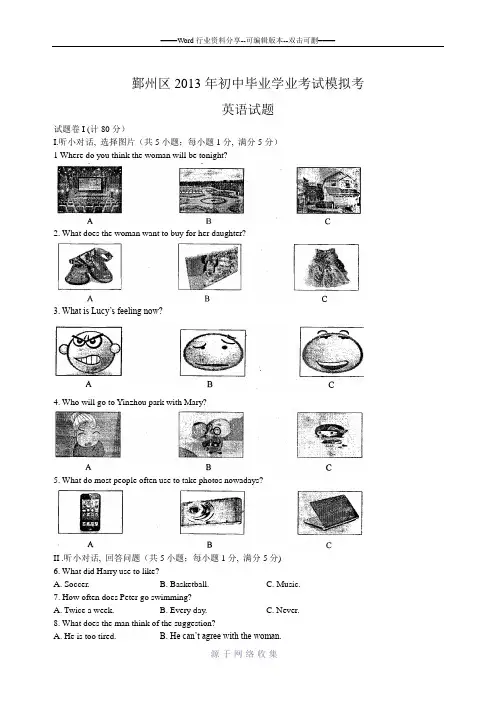
鄞州区2013年初中毕业学业考试模拟考英语试题试题卷I (计80分)I.听小对话, 选择图片(共5小题;每小题1分, 满分5分)1 Where do you think the woman will be tonight?2. What does the woman want to buy for her daughter?3. What is Lucy’s feeling now?4. Who will go to Yinzhou park with Mary?5. What do most people often use to take photos nowadays?II .听小对话, 回答问题(共5小题;每小题1分, 满分5分)6. What did Harry use to like?A. Soccer.B. Basketball.C. Music.7. How often does Peter go swimming?A. Twice a week.B. Every day.C. Never.8. What does the man think of the suggestion?A. He is too tired.B. He can’t agree with the woman.C. He would like to follow the woman around.9. Whose shoes are these?A. Sam’s.B. Peter’s.C. Steven’s.10. When does Jack usually get to school?A. 6:25B. 6:45C. 7:05III.听长对话, 回答问题(共5小题;每小题1分, 满分5分)听下面一段较长的对话, 回答第11至12两小题。
11. What’s the matter with the lady?A. She has lost her money.B. She has lost her way.C. She has lost her key.12. How will the lady go to Wanda Square?A. By bus.B. By car.C. On foot.听下面一段较长的对话, 回答第13至15三小题。
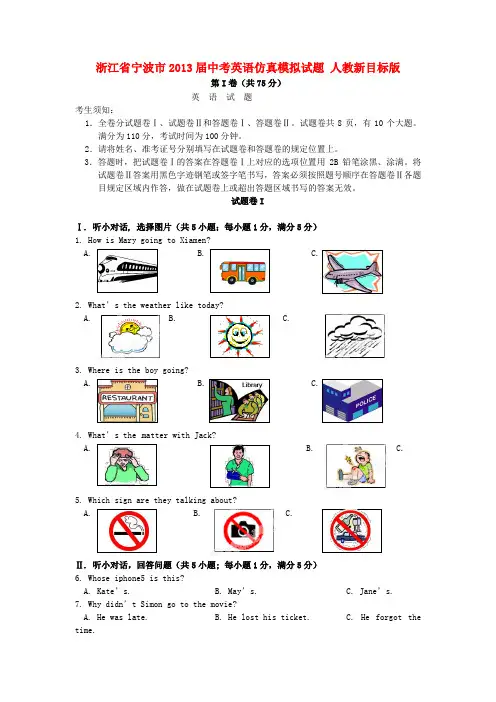
浙江省宁波市2013届中考英语仿真模拟试题 人教新目标版第I 卷(共75分)英 语 试 题考生须知:1.全卷分试题卷Ⅰ、试题卷Ⅱ和答题卷Ⅰ、答题卷Ⅱ。
试题卷共8页,有10个大题。
满分为110分,考试时间为100分钟。
2.请将姓名、准考证号分别填写在试题卷和答题卷的规定位置上。
3.答题时,把试题卷Ⅰ的答案在答题卷Ⅰ上对应的选项位置用2B 铅笔涂黑、涂满。
将试题卷Ⅱ答案用黑色字迹钢笔或签字笔书写,答案必须按照题号顺序在答题卷Ⅱ各题目规定区域内作答,做在试题卷上或超出答题区域书写的答案无效。
试题卷IⅠ. 听小对话, 选择图片(共5小题;每小题1分,满分5分)1. How is Mary going to Xiamen?A. C.2. What’s the weather like today? A. B. C.3. Where is the boy going?A. B. C.4. What’s the matter with Jack?B. C.5. Which sign are they talking about?A. B. C.Ⅱ. 听小对话,回答问题(共5小题; 每小题1分,满分5分)6. Whose iphone5 is this?A. Kate ’s.B. May ’s.C. Jane ’s.7. Why didn ’t Simon go to the movie?A. He was late.B. He lost his ticket.C. He forgot thetime.8. How long does Peter usually spend on his English homework?A. About half an hour.B. About an hour.C. About two hours.9. Where are the man and the woman probably talking?A. At a bus stop.B. At a mall.C. At a bank.10. How does the girl like the program?A. A little.B. Very much.C. Not at all. Ⅲ. 听长对话,回答问题(共5小题; 每小题1分,满分5分)听下面一段较长的对话,回答第11至12两小题。
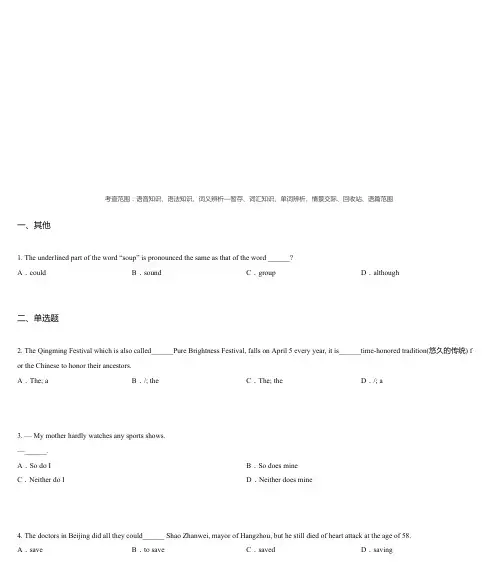
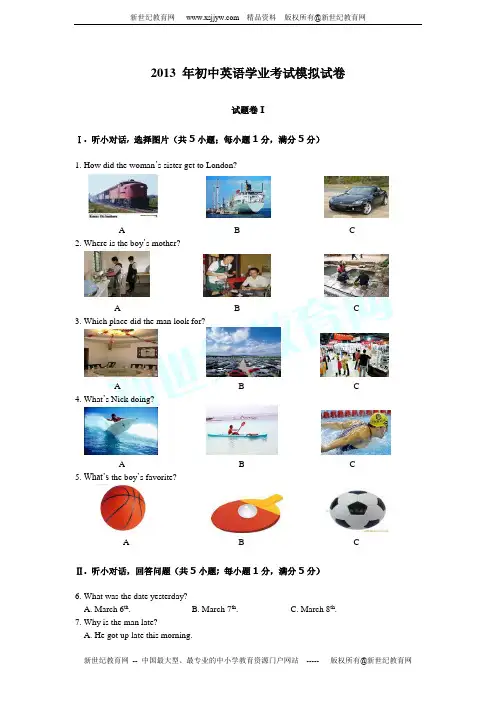
2013 年初中英语学业考试模拟试卷 试题卷IⅠ. 听小对话, 选择图片(共5小题;每小题1分,满分5分) 1. How did the woman ’s sister get to London?A B C2. Where is the boy ’s mother?A B C 3. Which place did the man look for?A B C4. What ’s Nick doing?A B C5. What’s the boy ’s favorite?A B C Ⅱ. 听小对话,回答问题(共5小题; 每小题1分,满分5分)6. What was the date yesterday?A. March 6th .B. March 7th .C. March 8th .7. Why is the man late?A. He got up late this morning.B. He didn’t go to bed last nightC. He had an accident on the way.8. What does the sign on the wall say?A. NO PARKING.B. NO PHOTOS.C. NO SMOKING.9. What’s the girl going to do tonight?A. She’s going to the cinema.B. She’s going to study for a test.C. She’s going to have classes.10. Who’s allowed to go out on school nights?A. JohnB. Ann C .Neither of them Ⅲ. 听长对话,回答问题(共5小题; 每小题1分,满分5分)听下面一段较长的对话,回答第11至12两小题。
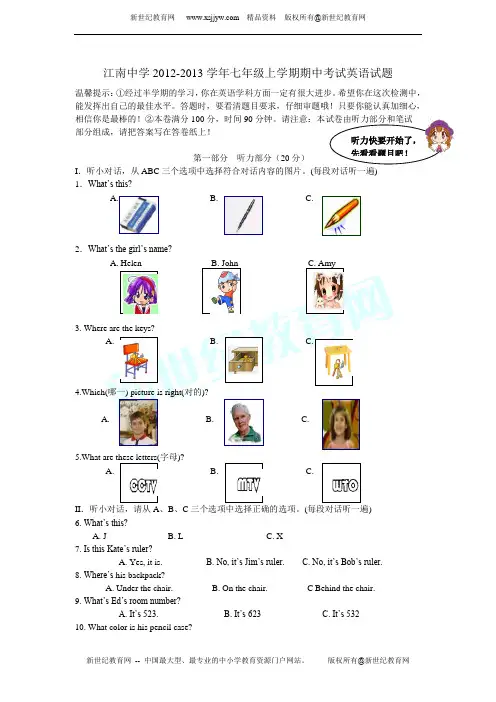
江南中学2012-2013学年七年级上学期期中考试英语试题温馨提示:①经过半学期的学习,你在英语学科方面一定有很大进步。
希望你在这次检测中,能发挥出自己的最佳水平。
答题时,要看清题目要求,仔细审题哦!只要你能认真加细心,相信你是最棒的!②本卷满分100分,时间90分钟。
请注意:本试卷由听力部分和笔试部分组成,请把答案写在答卷纸上!第一部分听力部分(20分)I.听小对话,从ABC三个选项中选择符合对话内容的图片。
(每段对话听一遍) 1.What’s this?A.B. C.2.What’s the girl’s name?A. HelenB. JohnC. Amy3. Where are the keys?A. B. C.4.Which(哪一) picture is right(对的)?A. B. C.5.What are these letters(字母)?A. B. C.II .听小对话,请从A 、B 、C 三个选项中选择正确的选项。
(每段对话听一遍)6. What’s this?A. JB. LC. X7. Is this Kate’s ruler?A. Yes, it is.B. No, it’s Jim’s ruler.C. No, it’s Bob’s ruler.8. Where’s his backpack?A. Under the chair.B. On the chair. C Behind the chair.9. What’s Ed’s room number?A. It’s 523.B. It’s 623C. It’s 53210. What color is his pencil case?听力快要开始了, 先看看题目吧!A. Red.B. Green.C. Yellow. III.听长对话,回答问题。
听下面一段长对话,回答第11至12两小题。
11.What’s under the chair?A. A dictionaryB. An ID cardC. A hat12.. What’s the number on the card?A. 34098527B. 40389275C. 43098275听下面一段长对话,回答第13至15三小题。
浙江省宁波市2013届初中英语毕业生学业模拟考试试题人教新目标版试题卷Ⅰ一、听力部分Ⅰ. 听小对话,选择图片(共5小题;每小题1分,满分5分)1.What time is it now?A. B. C.2.What will Mary get from the girl?A. B. C.3.What does the man usually do for vacation?A. B. C.4.How does Paul go to work?A. B. C.5.Where is the boy’s new teacher from?A. B. C.Ⅱ.听小对话,回答问题(共5小题;每小题1分,满分5分)6.What would the man like to drink?A. CoffeeB. cokeC. water7.How long wi ll the woman be away?A. One day.B. One weekC. One month.8. What did the girl do last night?A.She went to the cinema.B.She went to visit Lily.C.She was ill in hospital.9. What is under the chair?A. a rulerB. a penC. a pencil case10. Where is the woman going now?A.bookstoreB. post officeC. bankIII. 听长对话,回答问题(共5小题,计5分)听下面一段较长的对话,回答第11至第12两小题。
11.What are they doing today?A. playing tennisB. going swimmingC. cleaning thehouse12.What’s the probable relationship between the man and the woman?A. husband and wifeB. father and daughterC. mother andson听下面一段较长的对话,回答第13至第15三小题。
宁波市2013年初中毕业生学业考试英语模拟卷试题卷Ⅰ一、听力部分Ⅰ. 听小对话,选择图片(共5小题;每小题1分,满分5分1.What time is it now?A. B. C.2.What will Mary get from the girl?A. B. C.3.What does the man usually do for vacation?A. B. C.4.How does Paul go to work?A. B. C.5.Wh ere is the boy’s new teacher from?A. B. C.Ⅱ.听小对话,回答问题(共5小题;每小题1分,满分5分6.What would the man like to drink?A. CoffeeB. cokeC. water7.How long will the woman be away?A. One day.B. One weekC. One month.8. What did the girl do last night?A.She went to the cinema.B.She went to visit Lily.C.She was ill in hospital.9. What is under the chair?A. a rulerB. a penC. a pencil case10. Where is the woman going now?A.bookstoreB. post officeC. bankIII. 听长对话,回答问题(共5小题,计5分听下面一段较长的对话,回答第11至第12两小题。
11.What are they doing today?A. playing tennisB. going swimmingC. cleaning the house12.What’s the probable relationship between the man and the woman?A. husband and wifeB. father and daughterC. mother and son听下面一段较长的对话,回答第13至第15三小题。
用心 爱心 专心1浙江省宁波地区2012-2013学年九年级英语第一学期第一次月考试卷人教新目标版一、 听力部分20%I. 听小对话, 选择图片(共5小题; 每小题1分,满分5分)( ) 1. Which book does the boy want to buy?( ) 2. How will the weather be tomorrow?( ) 3. When will they meet at the school gate?( ) 4. What sport did Bill do?用心 爱心 专心2( ) 5. Where was the boy yesterday afternoon?Ⅱ. 听小对话,回答问题(共5小题; 每小题1分,满分5分)( ) 6. Could sixteen-year-olds be allowed to drive?A. Yes, they can.B. No, they can ’t.C. We don ’t know.( ) 7. What’s Lucy’s problem?A. She has no time to finish the exam.B. She always fails in the exam.C. She can’t sleep well before big exam.( ) 8. How does the boy go to school now?A. on foot.B. by bikeC. we don ’t know ( ) 9. How did Mike improve his English?A. By writing.B. By speaking.C. By reading.( ) 10. What is Tina terrified of?A. snakes.B. dogs.C. horses.Ⅲ. 听长对话,回答问题(共5小题; 每小题1分,满分5分)听下面一段较长的对话,回答第11至12两小题。
浙江省宁波市江南中学2013届中考英语模拟5月试题(一)人教新目标版审题人:谢烨命题人:周海峰注意事项:1.答案一律写在答卷上,写在试卷上无效。
2.答选择题必须用2B铅笔将答题卡上对应题目的选项标号涂黑,如需改动,请用橡皮擦干净后,再选涂其它答案。
3.请按照题号顺序在各题目的答题区域内作答,超出答题区域书写的答案无效;在草稿纸、试卷上答题无效。
4.本学科考试时间为100分钟,满分90分。
第一卷 (客观题共50分)一、单项填空(本大题共14分,每小题1分)1. Before I watched _______ 3-D film Life of Pi, I had never seen _______ wonderfulfilm like this.A. the; aB. a; aC. the; theD. a;the2. It’s crazy _______ you to buy the car at _______ high price.A. for; soB. about ; such aC. of; such aD. of; so a3. The food shop in Nanchan Temple _______ for two weeks, but I _______ there so far.A. has opened; haven’t goneB. has been open; hav en’t beenC. has been open; haven’t goneD. ha s opened; haven’t been4. _______ of the football players playing for the club _______ born in _______.A. Two-third; was; 1990sB. Two-third; were; the 1990sC. Two-thirds; was; 1990sD. Two-thirds; were; the 1990s5. — Shall we go to the station to meet our cousins?—I’ m afraid you _______. They will take a taxi by themselves.A. should n’tB. can’tC. mustn’tD.needn’t6. You’ve got so many books. Co uld you please lend me _______ to read?A. anythingB. anyC. somethingD. some7. The girl with a pair of sunglasses looks as _______ as the pop singer.A. beautifullyB. nicelyC. lovelyD. sweetly8. No one knew _______.A. who they play football withB. what our life would be like in the futureC. how had he gone to BeijingD. why wasn’t she afraid of it9. — My computer has gone wrong. It needs _______ soon.— Why not have David _______ it? Nobody can if he can’t.A. to fix; fixB. to fixed; fixingC. fixing; fixD.fixing; fixed10. Make plans before you do anything. That is to say, you should first _______how much time you need to finish it.A. work outB. work onC. take outD.come out11. _______ twins from all over the world take part in the Twins Days Festivalon August 5 in the city of Twinsburg, Ohio every year.A. Thousand ofB. Three thousand ofC. Thousands ofD. Three thousands of12. The young lady prefers _______ to _______ when she feels stressed.A. going shopping; calming downB. to go shopping; calm downC. going shopping; calm downD. to go shopping; calming down13. — Your picture is wonderful!— I worked for 8 hours _______ I finished it.A. beforeB. whenC. whileD. after14. — If you are in trouble, make sure to call the police.— _______A. I’m happy to hear that.B. I don’t know.C. I will. Thanks a lot.D. I have to think about it.二、完形填空 (本大题共10分,每小题1分)One day, a teacher was giving a speech to his students. He held up a glassof water and asked the class, “How 15 do you think this glass of water is?”The students’ answers were quite 16 ─ from 20g to 500g. “It doesn’t matter on the weight itself. It is decided by how long you 17 it. If I holdit for a minute, it is 18 . If I hold it for an hour, you will 19 to callan ambulance (救护车). It is exactly the same weight, but the longer I hold it, the heavier it becomes.”“If we carry our burdens (负担) all the time, sooner or later, we will not be able to carry on 20 the burden is becoming much heavier.”“What you have to do is to put the glass 21 , rest for a while before holding it up again.”We have to put down the burden sometimes so that we can 22 and are able to carry on. So after you return from 23 tonight, put the burden of the work down. Don’t carry it back home. You can 24 it up tomorrow.Whatever burden you are having now on your shoulders, let it down for a moment if you can.15. A. hot B. cold C. heavy D. light16. A. different B. same C. good D. bad17. A. drink B. hold C. throw D. take18. A. terrible B. heavy C. interesting D. light19. A. plan B. forget C. have D. remember20. A. because B. but C. though D. so21. A. up B. down C. off D. out22. A. relax B. sleep C. think D. wait23. A. home B. holiday C. rest D. work24. A. give B. clean C. pick D. turn三、阅读理解(本大题共26分,每小题2分)ATo us it seems so natural to put up an umbrella to keep the water off when it rains. But actually the umbrella was not invented as protection against rain. Its first use was as a shade (遮蔽) against the sun.Nobody knows who first invented it, but the umbrella was used in very ancient (古老的) times. Probably the first to use it were the Chinese, back in the eleventh century B.C.We know that the umbrella was used in ancient Egypt and Babylon as a sunshade. And there was a strange thing connected with its use: it became a symbol of honour and power. In the Far East in ancient times, the umbrella was allowed to be used only by royal (皇室的) people or by those in high office.In Europe, The Greeks were the first to use the umbrella as a sunshade. The umbrella was in common use in ancient Greece, but it is believed that the firstpeople in Europe to use the umbrella as protection against the rain were the ancient Romans.During the middle ages, the use of the umbrella practically disappeared. Then it appeared again in Italy in the late sixteenth century. And again it became a symbol of power.Umbrellas have not changed much in style during all this time, though they have become much lighter in weight. It was n’t until the twentieth century that women’s umbrellas began to be made in all kinds of colours.25. The first use of umbrellas was as __________.A. protection against rainB. protection against the sunC. a symbol of powerD. a symbol of honour26. According to the passage, the umbrella was probably first invented __________.A. in ancient ChinaB. in ancient EgyptC. in ancient GreeceD. in ancient Rome27. According to the passage, which of the following is NOT true?A. The umbrella didn’t change much in style in the 18th century.B. No one really knows who was the inventor of the umbrella.C. Once not everyone was allowed to use umbrellas.D. women’s umbrellas were m ade in all kinds of colours in the beginning. BIn Britain you may often hear “Drop in any time” or “Come to see me soon”, but you can’t really do that. People just say those things to make you feel welcome. It is better to telephone before visiting someone at home. If you receive a written invitation to an event that says “RSVP”, you should reply to let the person who sent the invitation know whether or not you plan to go.You should never accept an invitation unless you really plan to go. You may refuse by saying, “Thank you for inviting me, but I will not be able to come.” If, after accepting, you are unable to go, be sure to tell those who are expecting you as soon as possible that you will not be there. Although it is not necessarily expected that you give a gift to your host, it is considered polite to do so, especially if you have been invited for a meal. Flowers, chocolate, or a small gift are all appropriate (合适的). A thank-you note or telephone call after the visit is also considered polite and is an appropriate way to express your thanks for the invitation.28. What does the underlined word “RSVP” probably mean in Chinese?A. 请自便B. 请回复C. 请审阅D. 请来访29. What should you do if your British friend sends you an invitation but you do notwant to go?A. Do not give him or her an answer.B. Tell another friend to go instead of you.C. Tell him or her that you can’t be there for some reason.D. Tell him or her that you don’t want to go there.30. Which of the following is considered impolite in Britain?A. Buy small presents when invited.B. Refuse the invitation without telling anyone.C. Write a thank-you note after a visit.D. Give a telephone call after a visit.COnce I thought love meant flowers, gifts and sweet kisses. So, I really doubted whether there was any love between my parents. Every day they were working hard to pay for my high school. They didn’t act in the romantic ways that I read in books and saw on TV, and they certainly didn’t send flower s to each other on Valentine’s Day (情人节).One day, my mother was sewing a quilt (被子). I asked her if there was any love between her and my dad. She stopped and raised her head in surprise. Then she went on with her work without saying anything. I was very worried because I thought I had hurt her feelings. But after a few minutes she said, “Look at this thread (线). Sometimes it appears, but most of the time it disappears in the quilt. If life is a quilt, then love is the thread. It can hardly be seen anywhere or at any time, but it’s really there, and makes the quilt long-lasting.” I listened carefully but I didn’t understand her until the next spring.My mother suddenly got seriously ill and had to stay in hospital for about a month. Every morning and evening after she returned from the hospital, my father helped her walk slowly along our country road. There were many beautiful flowers, green grass and trees, and the sun gently shone through the leaves. All of this made the most beautiful picture in the world. Reading their eyes, I knew they love each other deeply. From this experience, I realized that love is just a thread in the quilt of our lives. Love is inside, making life strong and warm.31. What does the underlined sentence in the third paragraph suggest?A. There is beautiful scenery where the writer lived.B. There is true love anywhere in the world.C. There is no love without beautiful flowers.D. There is true love between the writer’s parents.32. Why didn’t the writer’s mother answer his ques tion immediately?A. Because her husband didn’t love her.B. Because she was thinking of a better answer.C. Because she didn’t love her husband.D. Because the writer had hurt her feelings.33. What is the best title of this passage?A. Love Is EverywhereB. Love Is Always RomanticC. Love: Thread in QuiltD. Love Can Last ForeverDThis year some twenty-three hundred teenagers (young people aged from 13 to 19) from all over the world will spend about ten months in US homes. They will attend US schools, meet US teenagers, and form impressions (印象) of the real America. At the same time, about thirteen hundred American teenagers will go to other countries to learn new languages and get a new understanding of the rest of the world.Here is a two-way student exchange in action. Fred, nineteen, spent last year in Germany with George’s family. In turn, George’s son Mike spent a year in Fred’s home in America.Fred, an active young man, knew little German when he arrived, but after two months’ study, the language began to come to him. Schools were completely different from what he had expected ─ much harder. Students rose politely when the teacher entered the room. They took fourteen subjects instead of the six that are usual in the United States. There were almost no outside activities.Family life, too, was different. The father’s word was law, and all activities were around the family. Fred found the food too simple at first. Also, he missed having a car.“Back home, you pick up some friends in a car and go out and have a good time. In Germany, you walk, but you soon learn to like it.”At the same time, In America, Mike, a friendly German boy, was also forming his idea. “I suppose I should criticize(批评) American schools,” he says. “It is far too easy by our level. But I have to say that I like it very much. In Germanywe do not hing but study. Here we take part in many outside activities. I think that maybe your schools are better in training for citizens (公民). There ought to be some middle ground between the two.34. The world exchange programme is mainly to __________.A. help teenagers in other countries know the real AmericaB. send s tudents in America to travel in GermanyC. let students learn something about other countriesD. have teenagers learn new languages35. Fred and Mike agreed that __________.A. American food tastes better than German foodB. German schools were harder than American schoolsC. Americans and Germans were both friendlyD. There were more cars on the streets in America36. In American schools __________.A. there is some middle ground between the two teaching buildingsB. there are a lot of after-school activitiesC. students usually take fourteen subjects in allD. students spend long hours studying37. After experiencing the America n school life, Mike thought __________.A. a better education should include something good from both America and GermanyB. German schools trained stud ents to be better citizensC. American schools were not as good as German schoolsD. the easy life in the American schools was more helpful to students第二卷 (主观题共40分)四、词汇运用 (本大题共8分,每小题1分)(A) 根据句意,写出括号内所给单词的适当形式。